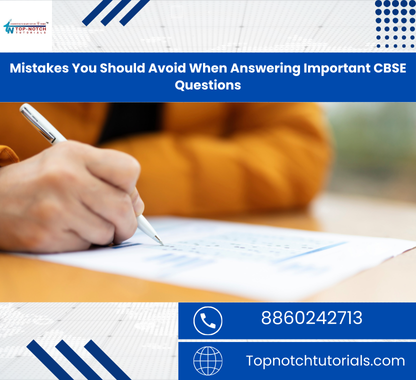
CBSE board exams are one of the most important milestones in the academic career of every student and in order to prepare and do well in these exams, students either use the CBSE critical questions personally or a good CBSE coaching institute in Dwarka makes them solve these questions for the sake of practice. These questions provide an idea of the structure and kinds of questions that might be seen in the real board exams. However, students usually make common mistakes when trying these questions, which can have an impact on their performance. In this article, we’ll examine the common mistakes students make while responding to crucial CBSE questions and look at ways to avoid them and do well on the test.
Common mistakes made by the students
- Ignoring Instructions: A lot of students fail to pay attention to or misunderstand the instructions given at the start of the question paper. To fully understand the format, scoring system, and any special instructions, it is essential to thoroughly study them.
- Time management: Poor time management might make you miss out on many important questions which could result in incomplete papers. Based on the grades given, allot time for each section and follow the timetable.
- Not rechecking answers: Quickly finishing could result in mistakes or omissions. Always set aside some time at the end to go over and revise your responses.
- Skipping questions: There are some students who skip difficult questions. Try answering every question, even if you’re not sure, as there are marks given on attempting steps as well
- Inaccurate Units: Make sure that, particularly in areas like science and mathematics, you utilize the appropriate units while responding numerically.
- Not understanding the Questions Properly: If you don’t understand the question properly, you will definitely write the wrong answer for it. Make sure you read the question well by taking your time to fully understand it.
- Unreadable Handwriting: If your handwriting is poor or not readable, the teacher will not be able to understand your answer and will give you lesser marks. To effectively communicate your ideas, write clearly and use readable diagrams.
- Ignoring multiple-choice Questions: There are frequently a few challenging options in multiple-choice questions. Before choosing your replies, carefully consider all of your possibilities.
How to avoid common mistakes?
- Carefully read the instructions: Read through all of the instructions on the key questions first. This phase guarantees that you know the marking method, structure, and any particular instructions for each component of the paper.
- Plan Your Answers: Give your answers some thought before writing, particularly for long-answer questions. Your responses will be more logical and clear if you plan beforehand and set up your ideas.
- Time management: Give each part a time restriction and follow it. This practice helps you properly manage your time during the actual board exams by simulating real test situations.
- Avoid Skipping Any Parts: Try answering every area of the crucial questions. Make an effort to increase your chances of receiving marks, even if you’re not sure about a certain portion.
- Respect Word Limits: Be mindful of the word restrictions imposed on each question. Writing less or too much can result in mark deductions that aren’t warranted.
- Review answers: Go over your answers after finishing the key questions. Verify for spelling and grammar problems as well as any questions that remain unanswered. Make sure your responses are well-presented because every point matters.
- Practice Often: It’s crucial to practice significant questions on a regular basis. You will get more comfortable with the format and the kinds of questions that will be on the test the more you practice.